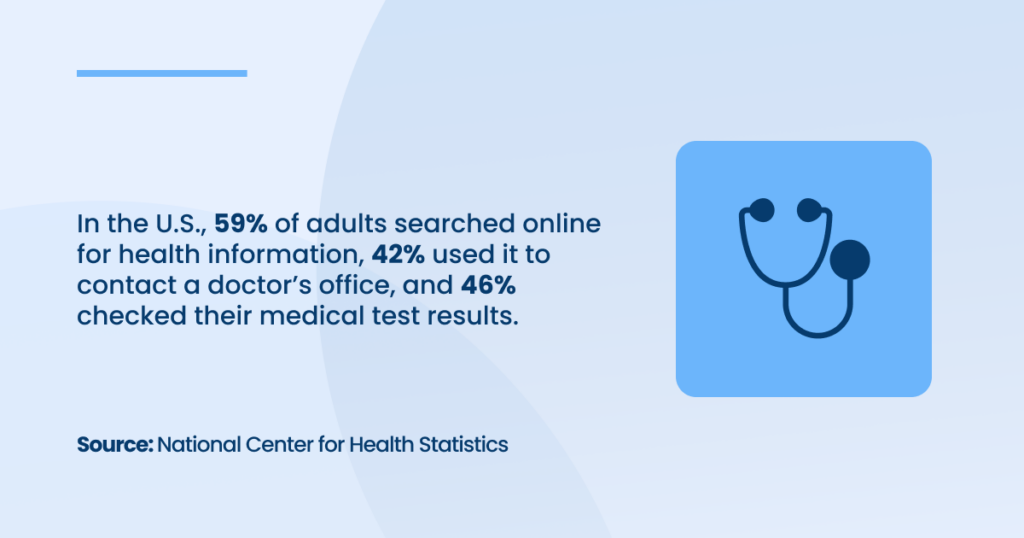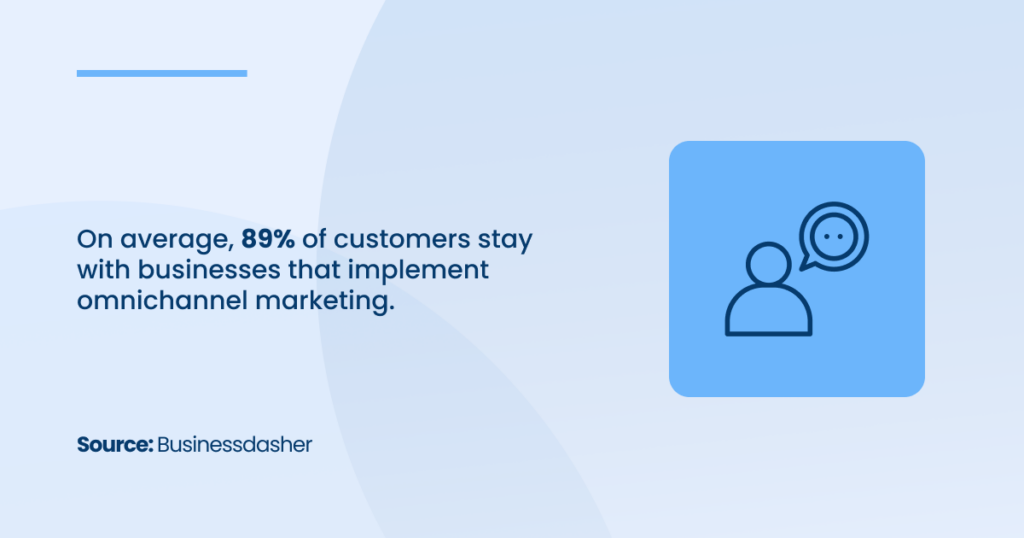Marketing for healthcare isn’t just about visibility—it’s about building genuine relationships. Patients want personalized, accessible, and reliable experiences. They seek brands that respect their privacy and understand their needs.

Source: National Center for Health Statistics
To stand out, healthcare providers need to move beyond basic strategies and embrace healthcare marketing trends that deepen patient trust and loyalty.
This article dives into seven essential trends in healthcare marketing that our B2C Marketing Agency uses to transform how healthcare brands connect with patients.
1. Personalization with a Purpose: AI-Driven Patient Journeys
Today’s patients expect a healthcare experience tailored to them, not one-size-fits-all. AI-driven personalization helps providers customize every step of a patient’s journey—from appointment reminders to follow-up care.
By analyzing data like medical history and preferences, AI ensures communications and treatment options are relevant to each individual.
For instance, a cardiology clinic using AI can track high-risk patients’ check-ups and lab results. If a patient’s results suggest increased risk, the system sends a personalized message to schedule a follow-up and share heart health resources.
Here’s a table of popular AI-driven personalization tools that healthcare providers can use to enhance patient journeys:
| Tool | Description | Key Features |
| Well Health | Patient communication platform for managing personalized outreach across channels | Appointment reminders, two-way messaging, personalized care follow-ups |
| Healthgrades | Patient acquisition and engagement tool for healthcare providers | Targeted email campaigns, personalized patient recommendations |
| Salesforce Health Cloud | CRM platform for healthcare, enabling tailored communication and patient engagement | 360° patient view, AI-driven insights, automated care reminders |
| Phreesia | Patient intake and engagement solution that personalizes the patient experience | Customizable intake forms, targeted health questionnaires |
| CareCloud | Comprehensive healthcare platform with patient engagement and AI analytics | Patient scheduling, follow-up reminders, treatment recommendations |
| Conversational AI by Nuance | AI-based virtual assistant for personalized patient support and care guidance | Virtual check-ins, symptom tracking, patient FAQs |
These tools help keep up with healthcare marketing trends and support patient engagement through targeted messaging, reminders, and recommendations, helping healthcare providers build trust and deliver a personalized experience at every interaction.
2. Local SEO for Building Community Connections
Local SEO is essential for healthcare providers seeking to connect with patients in their area. By optimizing Google Business profiles and local directories and creating location-specific pages on your website, you increase visibility for “near me” searches.
Source: Google
This targeted approach ensures that when nearby patients search for services you offer, your practice is easy to find.
Consistently updated profiles, accurate contact information, and encouraging patient reviews all strengthen your online presence.
This community-focused visibility aligns with trends in healthcare marketing by building trust and positioning your practice as an accessible, convenient option for local patients seeking care.
3. Enhancing Accessibility and Inclusivity Across Digital Channels
Accessible websites are essential in healthcare, ensuring all patients, including those with disabilities, can easily navigate and use online services.
Following ADA guidelines removes common web barriers and creates a more inclusive experience for everyone.
By implementing these practices, healthcare providers can show their commitment to accessibility, meet ADA standards, and build trust with a broader range of patients.
| Accessibility Practice | Description |
| High Color Contrast | Ensures readability for visually impaired users. |
| Alt Text for Images | Provides text descriptions for screen readers to convey visual content. |
| Keyboard-Friendly Navigation | Allows navigation without a mouse, supporting users with limited mobility. |
| Video Captions | Makes video content accessible to those who are deaf or hard of hearing. |
| Accessible Forms | Includes labels, instructions, and error indicators to improve usability. |
| Avoid Color-Only Cues | Ensures information isn’t conveyed by color alone, aiding color-blind users. |
Source: ADA.gov
These features enable all users—especially those with disabilities—to access essential healthcare information online, fostering inclusivity and ADA compliance.
Following this healthcare marketing trend also improves usability for all patients.
4. Transparent Data Privacy Practices and HIPAA-Compliant Marketing
With the increase in digital healthcare interactions, patients are more concerned than ever about data privacy. Ensuring HIPAA-compliant marketing practices is crucial to gaining patient trust.
This means handling all Protected Health Information (PHI) with the highest level of security, using encrypted messaging, secure patient portals, and consent management tools.
Being transparent about how patient data is collected, stored, and used can reassure patients and reduce privacy concerns.
By clearly communicating your data protection policies, you show patients that your practice values confidentiality and complies with strict privacy standards.
Following trends in healthcare marketing like these prevents compliance issues and strengthens patient loyalty and trust.
5. Streamlined Omnichannel Communication for Seamless Experiences
Today, patients interact with healthcare providers through multiple channels, including websites, apps, emails, social media, and in-person visits. Omnichannel communication integrates all these touchpoints, providing a consistent experience no matter how patients connect.
This approach ensures patients can schedule appointments, access information, and receive follow-ups smoothly across their preferred platforms.
To implement an effective omnichannel strategy, maintain a unified brand voice, offer key services like online scheduling on multiple channels, and use mobile-friendly tools.

Source: Businessdasher
Consistency across channels improves accessibility and reassures patients of your reliability and attention to their needs. Making every interaction simple and cohesive builds trust enhances patient satisfaction, and encourages long-term loyalty.
6. Empathetic Content Marketing: Patient-Centered Storytelling and Resources
Patients seek more than just clinical information—they want content that speaks to their experiences, concerns, and goals.
Empathetic content marketing uses patient-centered storytelling to make healthcare information relatable and reassuring.
This means sharing real patient success stories, creating FAQs that address common concerns, and producing educational resources that empower patients to make informed decisions.
For example, publishing articles, videos, or case studies that walk patients through a procedure can help ease anxiety and build confidence in your care. Providing clear, compassionate content fosters a supportive environment where patients feel understood.
This approach educates and creates a sense of connection, helping patients see your practice as a trusted partner in their healthcare journey.
7. Building Online Reputation Through Active Review and Feedback Management
Patients today rely heavily on online reviews when choosing healthcare providers, making reputation management a vital part of healthcare marketing trends. 75% of people said that a positive review makes them trust a healthcare provider more.
Encouraging satisfied patients to leave reviews and respond to feedback—whether positive or negative—demonstrates that your practice values patient experiences and is dedicated to continuous improvement.
Start by asking patients to review their visits soon after their appointments, and consider automating follow-up reminders to simplify the process.
When you respond to reviews, especially critical ones, address specific concerns respectfully and offer a solution if possible.
This proactive approach shows transparency and accountability, building patient trust and strengthening your online presence. A well-managed reputation attracts new patients and fosters loyalty among current ones.
Your Next Steps in Healthcare Marketing
Building patient trust and loyalty requires more than basic marketing in today’s digital healthcare landscape.
Each trend—AI-driven personalization, local SEO, accessibility, data privacy, empathetic content, omnichannel communication, and reputation management—adds unique value to a patient-centered experience.
At Azarian Growth Agency, we help healthcare businesses leverage these healthcare marketing trends to grow their patient base, attract new ones, and strengthen loyalty with data-driven SaaS marketing strategies.
Our services, including SaaS marketing support, SaaS SEO optimization, and customized SaaS landing page design, empower healthcare brands to succeed in a digital-first market. From personalized marketing plans to reputation management and omnichannel campaigns, our team ensures your brand stands out.
Ready to see how we can transform your practice’s marketing?
Get a Free Marketing Plan today and explore the growth opportunities for your healthcare business.

